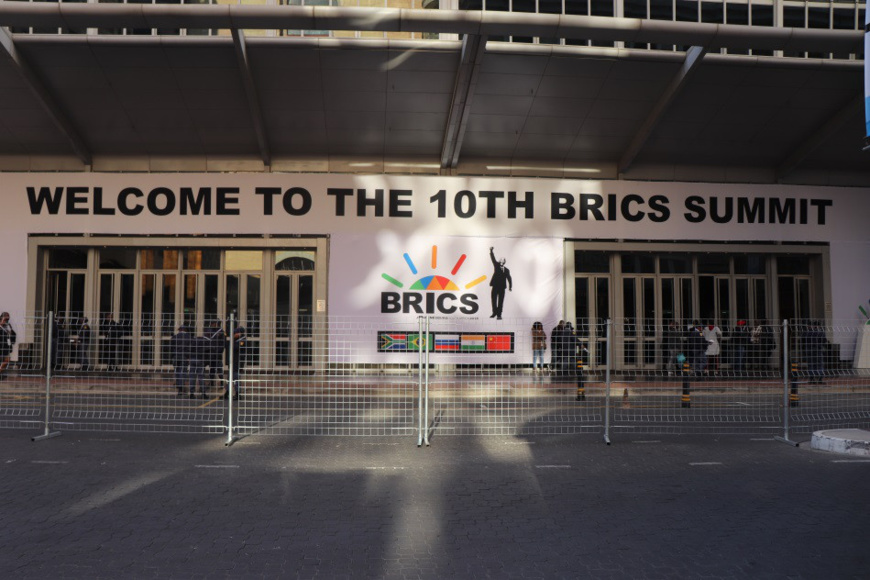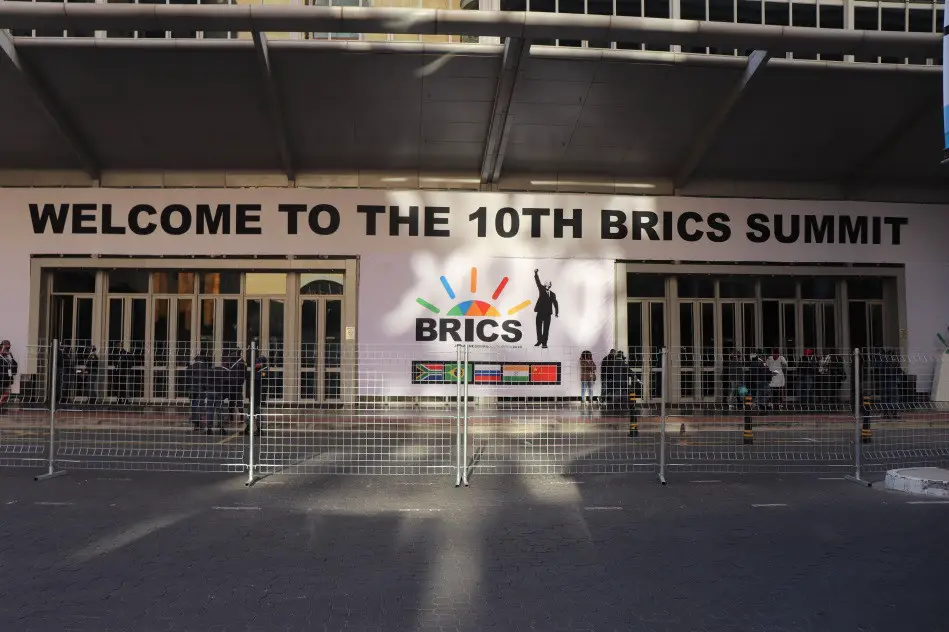By Li Ruohan

The 10th BRICS Summit was scheduled to run from Wednesday to Friday at the Sandton Convention Center in Johannesburg, South Africa. Photo by Liu lingling from People’s Daily
Enhanced international cooperation advocated by BRICS countries is contributing to a world order that is fairer and more open, analysts stressed on Thursday as the world's largest developing countries voiced strong opposition to protectionism during their ongoing summit in South Africa.
BRICS leaders and business delegates, including members of the BRICS Business Council, were present at the opening session of the bloc's 10th summit in Johannesburg on Thursday, which is expected to rally behind concerted efforts to revitalize Africa's industrialization agenda, the Xinhua News Agency reported.
BRICS countries should advocate win-win cooperation to build an open economy, pursue innovation and seize development opportunities, seek inclusive growth to deliver benefits to all countries, uphold multilateralism, and improve global governance together, Chinese President Xi Jinping said when addressing the BRICS Business Forum on Wednesday, Xinhua reported.
"BRICS countries should keep abreast of the historical trend, seize development opportunities, jointly meet challenges, and play a constructive role in building a new type of international relations and a community with a shared future for mankind," Xi said in front of about 1,200 government officials and business people on Wednesday.
Cooperation among BRICS countries will serve as an engine for globalization amid rising protectionism, Shen Yi, director of the Center for BRICS Studies at Fudan University, told the Global Times on Thursday.
US protectionism is disqualifying the country from being the leader of the current global order, which offers a chance for emerging countries that have the ambition to seek a fairer, more open order, said Shen.
It's not about building a new order and forming a group against the US, but promoting the positive evolution of the existing world order in a direction favoring greater fairness and openness, Shen stressed.
According to China's Ministry of Foreign Affairs, Xi met with Brazilian President Michel Temer on Thursday.
"China stands ready to join hands with Brazil to advance China-Latin America cooperation and push the economic and trade cooperation between China and the Portuguese-speaking countries to a higher level," Xi said.
Competitor or partner
Xi was also expected to meet with other leaders of the bloc, including Indian Prime Minister Narendra Modi, on the sideline of the summit.
This will be the third meeting between Xi and Modi since April, showcasing the positive momentum in China-India relations, Foreign Ministry spokesperson Geng Shuang said at a daily news briefing in Beijing on Tuesday.
As the two largest developing countries and emerging markets in the world, both China and India are willing to help Africa accelerate its industrialization and achieve self-driven development, said Geng, adding that China and India are on the same page when it comes to deepening cooperation with African countries.
However, economic cooperation between China and India is unlikely to progress if India maintains a skeptical or holds a negative attitude toward China-proposed projects, such as the Belt and Road initiative, said Hu Zhiyong, a research fellow with the Institute of International Relations at the Shanghai Academy of Social Sciences.
"India should not allow nationalistic sentiment to hold back its cooperation with China. Having too big of an ego, and perceiving China as a threat to its growth, will hurt the country over the long term," said Hu.
While India is keen to invest in African countries, it should not turn into a competitor of China's and should be more prudent in choosing projects to avoid overlap and waste, said Hu.
China and India have both been impacted by US trade protectionism, pushing New Delhi to hike tariffs last month on 30 US products in retaliation for US President Donald Trump's decision to slap additional taxes on Indian steel and aluminum, Indian's NDTV reported.
Speculators in India, especially among the country's elite, hold an "unrealistic idea" if they believe trade friction between China and the US is a good opportunity for India to cozy up to the US, said Shen.
"The Trump administration won't last long if the US continues to see shrinking exports and soaring deficits," Shen noted.
BRICS leaders and business delegates, including members of the BRICS Business Council, were present at the opening session of the bloc's 10th summit in Johannesburg on Thursday, which is expected to rally behind concerted efforts to revitalize Africa's industrialization agenda, the Xinhua News Agency reported.
BRICS countries should advocate win-win cooperation to build an open economy, pursue innovation and seize development opportunities, seek inclusive growth to deliver benefits to all countries, uphold multilateralism, and improve global governance together, Chinese President Xi Jinping said when addressing the BRICS Business Forum on Wednesday, Xinhua reported.
"BRICS countries should keep abreast of the historical trend, seize development opportunities, jointly meet challenges, and play a constructive role in building a new type of international relations and a community with a shared future for mankind," Xi said in front of about 1,200 government officials and business people on Wednesday.
Cooperation among BRICS countries will serve as an engine for globalization amid rising protectionism, Shen Yi, director of the Center for BRICS Studies at Fudan University, told the Global Times on Thursday.
US protectionism is disqualifying the country from being the leader of the current global order, which offers a chance for emerging countries that have the ambition to seek a fairer, more open order, said Shen.
It's not about building a new order and forming a group against the US, but promoting the positive evolution of the existing world order in a direction favoring greater fairness and openness, Shen stressed.
According to China's Ministry of Foreign Affairs, Xi met with Brazilian President Michel Temer on Thursday.
"China stands ready to join hands with Brazil to advance China-Latin America cooperation and push the economic and trade cooperation between China and the Portuguese-speaking countries to a higher level," Xi said.
Competitor or partner
Xi was also expected to meet with other leaders of the bloc, including Indian Prime Minister Narendra Modi, on the sideline of the summit.
This will be the third meeting between Xi and Modi since April, showcasing the positive momentum in China-India relations, Foreign Ministry spokesperson Geng Shuang said at a daily news briefing in Beijing on Tuesday.
As the two largest developing countries and emerging markets in the world, both China and India are willing to help Africa accelerate its industrialization and achieve self-driven development, said Geng, adding that China and India are on the same page when it comes to deepening cooperation with African countries.
However, economic cooperation between China and India is unlikely to progress if India maintains a skeptical or holds a negative attitude toward China-proposed projects, such as the Belt and Road initiative, said Hu Zhiyong, a research fellow with the Institute of International Relations at the Shanghai Academy of Social Sciences.
"India should not allow nationalistic sentiment to hold back its cooperation with China. Having too big of an ego, and perceiving China as a threat to its growth, will hurt the country over the long term," said Hu.
While India is keen to invest in African countries, it should not turn into a competitor of China's and should be more prudent in choosing projects to avoid overlap and waste, said Hu.
China and India have both been impacted by US trade protectionism, pushing New Delhi to hike tariffs last month on 30 US products in retaliation for US President Donald Trump's decision to slap additional taxes on Indian steel and aluminum, Indian's NDTV reported.
Speculators in India, especially among the country's elite, hold an "unrealistic idea" if they believe trade friction between China and the US is a good opportunity for India to cozy up to the US, said Shen.
"The Trump administration won't last long if the US continues to see shrinking exports and soaring deficits," Shen noted.
 Menu
Menu
 BRICS united on free trade
BRICS united on free trade
















